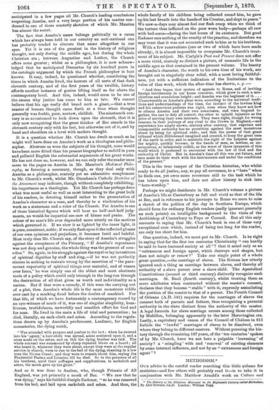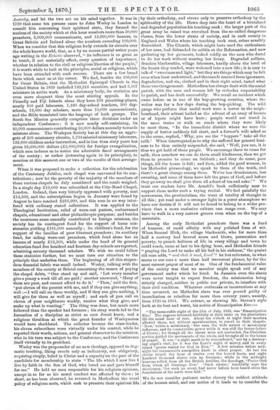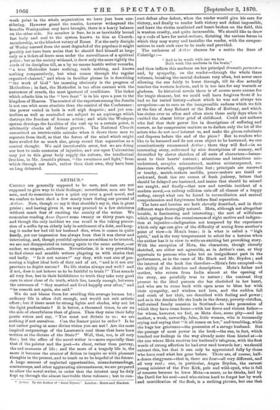METHODISM.* OUR advice to the careful reader searching this little
yolume for statistics—and few others will probably read it—is to take it in conjunction with Mr. Matthew Arnold's work on Culture and
* The History of the Religious Movement in the Righteenth Century called Methodism. By Abel Stevens, LLD. London: William Tegg.
Anarchy, and let the two act on his mind together. It was in 1739 that some ten persons came to John Wesley in London to consult him concerning their spiritual state, they formed the nucleus of the society which at this hour numbers more than 50,000 preachers, 3,000,000 communicants, and 12,000,000 hearers, in Great Britain and Ireland alone the numbers exceeding 100,000. When we consider that this religious body extends its circuits over the whole known world, that, as a by no means partial writer years ago writing in the Eclectic observed, " its influence is so great as to touch, if not materially affect, every question of importance, whether in relation to the civil or religious liberties of the people," it is worth while to look at the principles, social or religious, which have been attended with such success. There are a few broad facts which meet us at the outset. We find, besides the 100,000 for Great Britain, that the Methodist Episcopal Church in the United States in 1839 included 749,216 members, and had 3,567 ministers in active work. As a missionary body, its statistics are even more eloquent than the most stirring appeals. In the Friendly and Fiji Islands alone they have 230 preaching-places, nearly 100 paid labourers, 1,100 day-school teachers, 300 day- schools, 12,000 day scholars, more than 15,000 communicants, and the Bible translated into the language of both groups. The South Sea Mission generally comprises three divisions under an independent Conference ; it is now nearly self-sustaining, its 40,000 communicants contributing 50,000 dollars annually towards missions alone. The Wesleyan Society has at this day an aggre- gate of 509 missionary circuits, 1,730 salaried missionary labourers, 122,000 children under instruction, and in less than sixty years has given 19,000,000 dollars (£3,800,000) for foreign evangelization, which sum induces us to notice the admirable fiscal arrangments of the society ; or rather (returning again to its principles), to mention at this moment one or two of the results of that arrange- ment.
When it was proposed to make a collection for the celebration of the Centenary Jubilee, each chapel was canvassed for its con- tributions ; now let the poverty of the majority of the members of- those various chapels be duly considered and the result weighed. In a single day £10,000 was subscribed at the City-Road Chapel, London. Ireland, then very bitterly oppressed with poverty, sent £14,500, and the subscriptions begun in January were found by August to have reached £216,000, and this sum in no way inter- fered with ordinary stated collections. It was applied to the Theological Institution, relief of worn-out pastors, embarrassed chapels, educational and other philanthropic purposes ; and besides the enormous sums annually contributed to foreign missions, the society has its contingent fund for the support of home mis- sionaries yielding £161,000 annually ; its children's fund, for the support of the families of poor itinerant preachers ; its auxiliary fund, for aiding worn-out preachers, which fund alone has an income of nearly £12,500, while under the head of its general education fund five hundred and fourteen day-schools are reported, admitting seventy thousand scholars. We wish we could follow these statistics further, but we must turn our attention to the principle that underlies them. The beginning of all this stupen- dous financial fabric was small indeed. 'Wesley, talking with the members of the society at Bristol concerning the means of paying the chapel debts, " One stood up and said, ' Let every member give a penny a week till all are paid ;' another answered, ' Many of them are poor, and cannot afford to do it.' Then,' said the first, put eleven of the poorest with me, and if they can give anything, well :—I will call on them weekly, and if they can give nothing, I will give for them as well as myself ; and each of you call on eleven of your neighbours weekly, receive what they give, and make up what is wanting." The thing was done, but much more followed than the speaker had foreseen ; his stray words led to the formation of a discipline as strict as ever Jesuit knew, and a religious thraldom at which the great founder of Wesleyanism would have shuddered. The collector became the class-leader, his eleven subscribers were virtually under his control, while he reported their words, actions, and general character to the minister, who in his turn was subject to the Conference, and the Conference itself virtually to its president.
Wesley was the propounder of no new theology, opposed to dog- matic teaching, liking creeds only as indicatory, not obligatory, requiring simply, belief in Christ and a capacity on the part of the candidate for membership to state "The life which I now live I live by faith in the Son of God, who loved me and gave himself for me." He held no man responsible for his religious opinions, except in so far as his moral conduct was affected by them ; in short, as has been observed, he reversed in Methodism the usual policy of religious sects, which seek to preserve their spiritual life by their orthodoxy, and strove only to preserve orthodoxy by the spirituality of the life. Down deep into the heart of a brutalized and degraded population his teaching sank ; the larger part of the great army he raised was recruited from the so-called dangerous classes, from the lower strata of society, and in each county in England and Wales where his teaching took root, crime sensibly diminished. The Church, which might have used the enthusiasm of her sons, had disbanded its militia at the Reformation, and now gathering up her garments, looked coldly on the men who dared to do her work without wearing her livery. Degraded colliers, drunken blacksmiths, village labourers, hardly above the level of the beasts they tended, were wakened into a new life ; it is easy to talk of " sweetness and light," but they are things which may be felt even when least understood, and thousands rescued from ignorance, degradation, and sin, clothed and in their right mind, tasted what those two things meant. Methodism has always dealt with the social pariah, with the men and women left by orthodox respectability to perish, and has dealt successfully. We recall an incident which came before us in one of the hop-growing counties, where the writer was for a few days during the hop-picking. The wild gangs who perform that useful work were a terror to the neigh- bourhood, their advent hailed as the advent of an army of locusts or of lepers might have been ; people would not travel in the same trains or walk on roads where they were likely to meet them, "In the immediate district where we were the supply of butter suddenly fell short, and a farmer's wife asked as to the cause, replied, ' Why, you see the " hoppers " take all the milk.' When interrogated as to why she suffered her general busi- ness to be thus entirely suspended, she said, ' Well, you see, it is thus we get hold of these people. We encourage them to come for milk, then somehow we can do them small kindnesses, then we get them to promise to come on Sabbath ; and they do come, poor things, till the house is full ; and then, added the good woman, in her Methodist phraseology, we speak to them of the truth, and there's a great change among them. We've less drunkenness, less swearing, and some of them have felt the grace of God, and before they go away we shall give them all a feast of tea and cake.' " We trust our readers have Mr. Arnold's book sufficiently near to support them under such a trying recital. We feel painfully the narrowness, the provincialism, the want of totality of thought in all this ; yet read under a stronger light in a purer atmosphere we have our doubts if it will not be found to belong to a wider pro- vince than a more exclusive culture can range over. We may have to walk in a very narrow groove even when on the top of a mountain.
Among the early Methodist preachers there was a fund of humour, of small affinity with any polished form of wit_ When Samuel Hick, the village blacksmith, who for more than half a century had braved scorn and blows, persecution and poverty, to preach holiness of life in every village and town ho could reach, came at last to his dying hour, and Methodist friends " praying the Lord to make all his bed in his sickness," the quaint old man adds, "and slack it weel, Lord"! he but reiterates, in what seems to our ears a more than half irreverent phrase, by far the most earnest prayer of most of us. One of the fundamental rules of the society was that no member might speak evil of any government under which he lived. In Jamaica even the slaves were never taught to expect freedom, the missionaries being strictly charged, neither in public nor private, to interfere with their civil condition. Whatever outbreaks or insurrections at any time occurred, no Methodist slave was ever proved guilty of incendiarism or rebellion for more than seventy years, namely, from 1760 to 1834. We extract, as showing Mr. Steven's style both at its best and worst, his notice of Emancipation Eve :—
" The memorable night of the 31st of July, 1834, was 'Emancipation Eve.' The negroes laboured faithfully at their tasks on the plantations till the usual hour of rest. About ten o'clock at night their masters allowed them, not without apprehensions, to resort to their chapels. Now,' writes a missionary, ' was seen the wide extent of missionary influence, and its conservative power while it was still the foster-father of liberty ; for though all the slaves were not converted, the Christian portion guided the movements of the whole, and brought all to the house of prayer. It was "a night much to be remembered," not by a destroy- ing angel's visit, for it was the Lord's night of mercy, and in every island "praise waited for God in Zion."' A few minutes before mid- night the innumerable assemblies knelt in silent prayer. At last the clocks struck the hour of twelve over the bowed hosts, and eight hundred thousand slaves rose up freemen ; while to the midnight heavens rolled, from all the British Antilles, the doxology, 'Praise God
from whom all blessings flow.' Such strains,' truthfully says the missionary, 'for such an event, had never before been heard since the foundations of the earth were laid.' "
We do not consider patience under slavery the noblest attitude of the human mind, and our notice of it leads us to consider the weak point in the whole organizatiou we have just been con- sidering. However grand the results, however widespread the benefits Wesleyanism may have brought, there is a heavy balance on the other side. No member is free, he is as inevitably bound fast body and soul to the system known to him as Church- membership, as the blindest votary of Rome. Far the early disciple of Wesley rescued from the most degraded of the populace it might possibly not have been amiss that he should find himself at large only as a ticket-of-leave man under the surveillance of a spiritual police ; but as the society widened, it drew only the more tightly the cords of its discipline till, as a by no means hostile writer remarks, -" a true Methodist hears nothing, reads nothing, and knows nothing comparatively, but what comes through the regular -organized channel," and when in familiar phrase he is describing -" the work of God" his meaning obviously is the progress of Methodism ; in fact, the Methodist is too often content with the -narrowest of creeds, the most ignorant of conditions. The ticket which admits him to the " love feast" is in his eyes a pass to the kingdom of Heaven. The control of the superiors among the Jesuits -is not one whit more absolute than the control of the Conference ; the power vested in both is well nigh despotic ; and yet con- Irollers as well as controlled are subject to an espionage which 'destroys the freedom of human action ; and while the Wesleyan system develops the faculties of the soul up to a certain point, it arbitrarily checks all further growth. The National Church -committed an irretrievable mistake when it drove these men to separate from itself, so that the forces of the mind which might have availed for so much else, group round that separation as a central thought. We said irretrievable error, but we are doing our best to undo centuries of injustice, and our open Universities may yet to this great body supply the culture, the intellectual -freedom, in Mr. Arnold's phrase, "the sweetness and light," from which through our fault, rather than their own, they have been so long debarred.
































 Previous page
Previous page